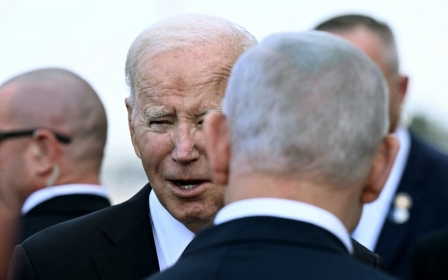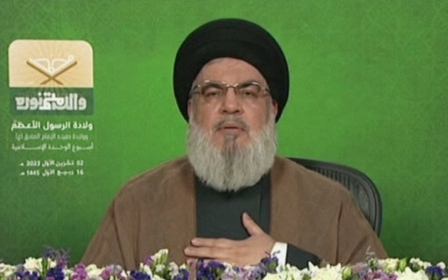Israel-Palestine war: US walks a tightrope that could lead to regional war

As Israel, backed by the US, prepares for a ground invasion of Gaza, the security of US bases and interests in the Middle East is increasingly under scrutiny due to the threat of attacks originating from Lebanon, Syria, Iraq, and Yemen.
The Pentagon confirmed on Tuesday that US troops have been attacked 10 times in Iraq and three times in Syria since 17 October.
A day earlier, US officials said they had not received any indication that Iran’s supreme leader, Ayatollah Ali Khamenei, had issued a directive to attack its forces in the region.
This uncertainty adds to the complexity of the situation and will determine how the US goes forward.
The US has been the biggest backer of Israel in the conflict so far and has dispatched military advisors including senior officers, as well as expedited the delivery of advanced air defence systems, not only to Israel but elsewhere in the region.
Stay informed with MEE's newsletters
Sign up to get the latest alerts, insights and analysis, starting with Turkey Unpacked
This move aligns with reports of US pressure on Israel to delay its planned ground invasion of Gaza, so that Washington can be ready for any expansion of the conflict.
Another key element that could determine whether the US is dragged into war is the worsening humanitarian situation in Gaza and the heavy civilian death toll.
The situation has even garnered the attention of former US President Barack Obama, who cautioned against downplaying Palestinian suffering and warned about further repercussions.
Follow Middle East Eye's live coverage for the latest on the Israel-Palestine war
As of Tuesday morning, more than 5,700 Palestinians have been killed in Israel's bombing of Gaza, of which more than 2,000 have been children.
At least 1,400 Israelis were killed on 7 October, when Hamas-led Palestinian fighters broke through the perimeter separating Gaza from Israel.
With thousands of casualties on both sides, a ground invasion of Gaza could potentially lead to intervention by US adversaries and a strain on relations with key allies.
Jordan, in particular, faces a "worst-case scenario" in anticipation of a Gaza incursion, amid mounting calls to cancel its peace treaty with Israel.
This presents not only a challenge for Israel but a dilemma for Washington also
Regional conflagration
US officials are preparing for potential escalations on multiple fronts, particularly in relation to Iran and the groups it backs in Lebanon and Iraq. Recent attacks on US troops in Iraq and Syria illustrate the volatile situation.
Currently, the US maintains a military presence of 2,500 troops in Iraq, and an additional 900 troops are positioned in northeastern Syria as part of their participation in the global coalition against Islamic State (IS).
The most significant US military facility in the region is al-Udeid Air Base, situated in Qatar.
Experts and analysts specialising in the Middle East contend that Washington has made substantial mistakes since the 7 October attack in Israel.
These strategic errors have brought the region closer to the potential of a large-scale war.
“Given the high emotion, it would not be unforeseeable for individuals to turn a blind eye to abuse or even retribution for grievances held against Israel,” Matthew Hedges, Middle East security expert, told Middle East Eye
“Considering the near complete array of US military bases across the MENA, the potential threat is enormous."
Arab officials aware of the risk of regional escalation are calling for an immediate ceasefire.
When questioned at the UN Security Council briefing on Tuesday regarding the potential for regional escalation, Jordan’s Deputy Prime Minister and Minister of Foreign Affairs Ayman Safadi acknowledged it as a significant concern.
"It is indeed a real threat," he emphasised.
Safadi along with his Saudi and Egyptian counterparts at the briefing called for an immediate ceasefire and urged the international community to intervene and prevent a larger conflict.
Anti-Israel sentiment has been on the rise, not only in the Muslim world but also globally.
Arab and Muslim communities increasingly perceive themselves as being at odds with the West.
Safadi warned that "the ongoing war in Gaza is contributing to a perilous perception in the Arab and Muslim world that they are in conflict with the West," emphasising the need for those supporting Israel's actions to recognise this growing danger.
Iranian involvement
Hezbollah, based in Lebanon, has engaged in retaliatory skirmishes with Israel. Their willingness to engage in the ongoing conflict highlights the severity of the situation, although resource limitations remain a concern.
“Iranian allied proxies such as Hezbollah in Lebanon are far better equipped and organised. They are also seen as a far greater threat to Israel than Hamas, and this is why Tel Aviv has not immediately invaded Gaza,” Hedges said.
Iran has been involved in diplomatic efforts to end the conflict, keeping away from direct military involvement. This is despite claims from some in the US and Israel regarding Iran's involvement in the surprise attack on Israel.
On Sunday, Iranian Foreign Minister Hossein Amir Abdollahian warned the US and Israel that the situation in the region could quickly deteriorate “at any moment” if the US persists in what he termed a “proxy war” on Gaza.
The White House disclosed on Monday instances where Iran is allegedly supporting rocket and drone attacks on US military installations in Iraq and Syria by Iranian-backed proxies.
This has prompted US President Joe Biden to instruct the Department of Defense to prepare for further assaults to safeguard their interests in the region, the White House said.
“It is unlikely that the Iranian state will formally get involved in the conflict. The Islamic Revolutionary Guard Corps (IRGC) however will nearly certainly get involved through the sustained delivery of arms, personnel, and ideological support. There could also be instances whereby IRGC soldiers are directly attributed for attacks,” Hedges said.
The Iran-backed Houthi group in Yemen has also threatened hostilities against Israel if Washington got directly involved in the Israeli military campaign in Gaza.
Recent incidents involving missile and drone attacks originating from Yemen further highlight the severity of the situation.
The Pentagon confirmed last week that a US Navy ship in the Red Sea intercepted missiles and drones fired by Iran-backed Houthi rebels in Yemen, with targets potentially including Israel.
'Iranian allied proxies such as Hezbollah in Lebanon, are far better equipped and organised. They are also seen as a far greater threat to Israel than Hamas'
- Matthew Hedges, Middle East security expert
The Houthis claimed responsibility for the attack, with Abdulaziz bin Habtour, the head of its government in Sanaa, stating: "We launched these missiles as a form of solidarity with the people of Gaza."
Habtour also issued a warning, threatening to target Israeli ships in the Red Sea if military operations continued in Gaza.
In Yemen, there are calls to close the Bab al Mandab Strait, controlled by Aden-based government forces, backed by the Saudi-led coalition.
Maintaining control over Hodeidah's Red Sea shoreline gives the Houthis the ability to threaten international shipping and potentially shut down the Bab Al Mandab strait, resulting in extended travel times and higher shipping expenses, as it would shut off access to the Suez Canal.
“Given the IRGC’s previous hijacking of ships throughout the Straits of Hormuz and Bab al Mandeb, it is likely this would happen again,” Hedges said.
The Houthis in Yemen are reported to have the capacity to engage in the conflict from various locations within Yemen, posing a potential threat to US interests both inside and outside Yemen.
The exact presence of the US forces in or near Yemen is uncertain. However, Hedges explained that there have been reports of US troops being located in areas such as Mokha on Yemen's Red Sea coast, Mukalla in Hadramout, and on the Islands of Socotra.
Additionally, there are two US ships in the Red Sea off the coast of Yemen. Hadhramout is considered a “serious vulnerability as [Al Qaeda] are highly operational in this vicinity”, according to Hedges.
Given all these considerations, the region has become a tinderbox.
Israel's relentless bombardment of Gaza continues to cause immense suffering to Palestinian civilians and the likelihood of a broader conflict remains a significant concern for those who live in it and further afield.
American interests are a top target for anti-Israel powers in the region, further heightening the importance of diplomatic efforts and a swift resolution to the crisis.
This article is available in French on Middle East Eye French edition.
Middle East Eye delivers independent and unrivalled coverage and analysis of the Middle East, North Africa and beyond. To learn more about republishing this content and the associated fees, please fill out this form. More about MEE can be found here.






